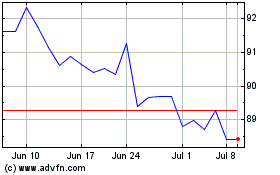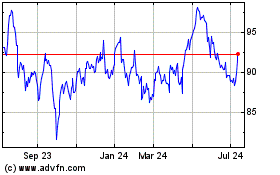Heat Wave Sets Records, but Relief Is in Sight -- Update
July 21 2019 - 7:06PM
Dow Jones News
By Scott Calvert and Keiko Morris
A heat wave that gripped a large section of the U.S. set
temperature records over the weekend from the Ohio Valley to the
East Coast, but the power grid held up and forecasters said cooler,
wetter weather was expected to begin arriving Monday.
About 72 million people were under excessive-heat warnings
Sunday, down from about 128 million on Saturday, according to the
National Weather Service. Temperatures on Sunday reached the
upper-90s to around 100 degrees from eastern Kansas into the Ohio
Valley and from the mid-Atlantic into parts of New England.
Atlantic City International Airport in New Jersey saw 100 degrees,
breaking the previous July 21 record of 99 degrees.
High humidity made it feel even hotter. The heat index on Sunday
ranged from 105 to 110 degrees from North Carolina to Boston, said
Jim Hayes, a weather-service meteorologist, and reached 112 in
places.
"What made this situation unusual is the high humidity values,"
Mr. Hayes said.
Power companies in the greater New York City region had crews
working over the weekend to respond to scattered outages.
Consolidated Edison Inc., the utility that powers most of the city,
expected a record for Sunday usage, eclipsing the record of 11,669
megawatts set Aug. 14, 2016, a spokesman said.
Despite huge demand, PJM, the power grid that serves parts of 13
states from Virginia to Illinois, said it saw no outages and no
transmission issues over the weekend. A PJM spokeswoman said
Saturday's peak load of 150,693 megawatts of electric demand
appeared to be an all-time record for that day of the week.
A cold front will bring cooler air and rain starting Monday, and
by Tuesday temperatures will be normal or below normal in much of
the U.S. east of the Rockies. But Mr. Hayes said thunderstorms and
damaging winds are likely from Tennessee to southern New England,
and there is a heightened risk of flash flooding along the
Interstate 95 corridor between Washington, D.C., and New York
City.
Saturday's heat broke or tied records in a number of East Coast
cities. Millinocket, Maine, reached 93 degrees, tying a record for
the date. Manchester, N.H., set a record for the date of 97
degrees, breaking a mark set in 1949. And it hit 99 degrees at John
F. Kennedy International Airport in New York, the highest on record
for July 20.
At the same time, about 40 U.S. cities on Saturday tied or broke
records for the highest minimum temperature on that date, as
overnight temperatures remained in the high-70s or above 80 degrees
across much of the Ohio Valley, mid-Atlantic and New England.
In Annapolis, Md., Saturday's sultry low of 84 degrees broke a
record for July 20. On Saturday, New York's Central Park didn't get
below 82 degrees. That tied the record-high minimum for the date
and was two degrees below the warmest low temperature observed for
any date since record-keeping began back in 1869: 84 degrees.
In New York City, emergency medical workers and firefighters
faced a surge in calls during the weekend's extreme heat, city
officials said. Calls for emergency medical services typically
range between 4,000 and 4,500 on any day. On Friday, calls reached
4,606, and they soared to 5,143 on Saturday. As of noon Sunday, the
city received 2,191 emergency calls.
Patients over 65 years old made up 70% of the 236 heat-related
calls to 911 between Friday and noon on Sunday, a city official
said.
Detainees in New York City jails were offered unlimited cool
showers, water and ice. While most are housed in facilities with
air conditioning, those without it had fans, a city spokeswoman
said.
In Cincinnati, fans arriving at sweltering Great American Ball
Park for Saturday evening's Reds-Cardinals baseball game heard a
wintry mix of songs over the stadium sound system, including "Let
It Snow," "Frosty the Snowman" and Foreigner's "Cold as Ice."
Aaron Sharpe, a DJ who picks the stadium's songs, said his
instinct was to play heat-related songs -- but he decided to go
cold. "These people are hot enough as it is, we don't need to
remind them of that fact," he said.
Write to Scott Calvert at scott.calvert@wsj.com and Keiko Morris
at Keiko.Morris@wsj.com
(END) Dow Jones Newswires
July 21, 2019 18:51 ET (22:51 GMT)
Copyright (c) 2019 Dow Jones & Company, Inc.
Consolidated Edison (NYSE:ED)
Historical Stock Chart
From Mar 2024 to Apr 2024

Consolidated Edison (NYSE:ED)
Historical Stock Chart
From Apr 2023 to Apr 2024
